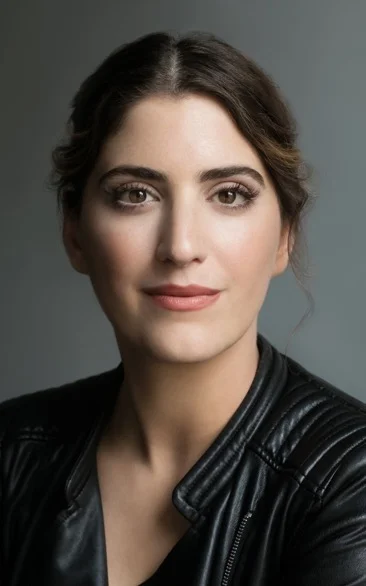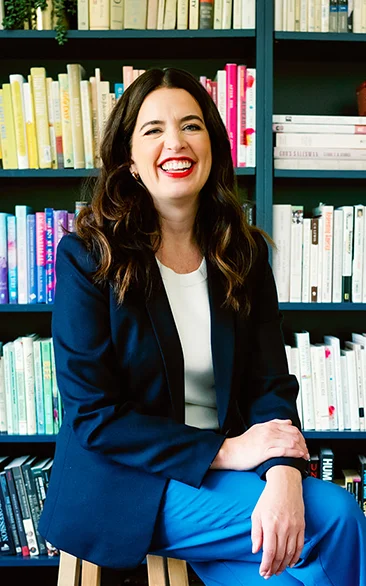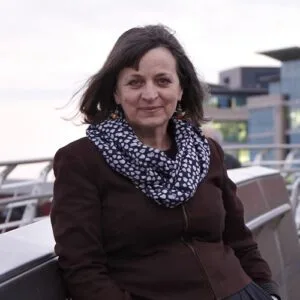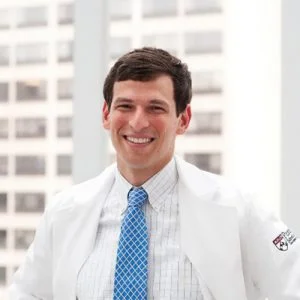Kate Bowler: I’m Kate Bowler, and this is Everything Happens. I’m a historian, author, aggressively, fast walker. But lately, in a world that promises endless progress, even now in a pandemic, I realized I just need to be a person. It’s hard to give up on the feeling that the life you want is just out of reach. If only you tried to eat this food, find that relationship, just get the kids graduated or the parents this kind of care. Only then will I feel different, better, whole.But that’s not the way this works. When I was 35, I was diagnosed with stage four cancer. And here’s the very fun thing about that. The world loves you better when you are shiny, when you are cheerful, when you still believe that your best life now is right around the corner. I’ve written multiple books on the history of the idea that you can always fix your life. So I’m going to be the one to say it. There are some things we can change and some things we can’t. And it’s OK that life isn’t always getting better. We can have beauty and meaning, community and love, and we will need each other if we’re going to tell the truth. Life is a chronic condition and there’s no cure for being human.
Kate: There’s always that part of the conversation where you start apologizing. Thanks so much for listening for so long or sorry, I know this is a lot or I shouldn’t be telling you all this. It’s so depressing. You needed someone to listen, sit close as the story unspools. I didn’t want my life to be this way. I don’t know how I’m going to move forward. I am so scared. But now it seems embarrassing, isolating, costly. I was sitting on the couch with one of my best friends recently who was really sick after a sudden cancer diagnosis. She’s struggling through treatment that leaves her too thin, too sallow and struggling to get out of bed. She lost all of her thick mermaid hair and her small head is covered in a patchy fuzz, she’s powering through with all her tiny might. But this disease does not care how hard she works. She tries to change the subject, not for her, but for me. Cancer is a living death, and she wants to spare me. I can see it in her giant Disney eyes. She is starting to believe that it’s too much. She’s too much. She is the bad thing. My guest today understands that feeling, a feeling like the bad thing to the people around her. Today, we’re talking about the toll illness takes on those around us and then the boomerang effect that has on the suffering. There is a weird tension when we want so badly for the people we love to support us, but want to shield them from the pain at the same time. This is a beautiful, terrible kind of love. This is part two of my conversation with the amazing Suleika Jaouad.
Kate: If you haven’t listened to part one, go back and listen because it is so rich. But either way, you’re going to love this one. At 22 years old, Suleika was diagnosed with leukemia. She endured year after year after year of intense chemotherapy and a brutal and isolating bone marrow transplant. Out of that experience, she wrote the Emmy Award winning New York Times column and video series Life Interrupted, and her gorgeous memoir about her experience living between the world of the sick and the world of the well was an instant bestseller. It’s called Between Two Kingdoms and you will love it so much. Suleika, it’s so good to talk to you again.
Kate: You write with such gorgeous candor about the ugly feelings around feeling robbed, feeling like you want to be someone who is easy to love, easy to care for, and then feeling tremendous resentment and fear and frustration, especially inside of a relationship in which a boyfriend then becomes a caregiver. I don’t hear a lot of, wonderfully like the unromantic parts of that, and so I’m just so glad that you’re honest about that, because we have a lot of beautiful caregivers in this who listen to this podcast. And I think there’s so much pressure for both parties to feel like there’s a Hallmark version of that dynamic. And you’re really clear that there is there is always a lot going on in that dyad.
Suleika: Yeah, I don’t think there is ever a Hallmark version of any of life. And we all feel that pressure. And there’s kind of Instagram world where we’re made to feel like we have to kind of put forth our most beautiful, shiny, curated moments. And I think the same is true when you’re writing a memoir. It’s hard to go to those places, even if that’s what you set out to do, which is exactly what I did. And the reason that felt important to me is that there are so many things about illness that feel profoundly isolating and lonely. But for me, the things that made me feel especially lonely were those aspects of illness that aren’t palatable, that aren’t what you thought they would be, that feel unsavory or ugly or shameful. And to me, shame is like the most isolating state that any of us can exist in. And I wanted to give ink to those things to show those beautiful moments that can arise when you’re in the midst of a reckoning, but also to show the way that it can fracture relationships, incredible burdens and stresses it can place on our psyches, on our bodies on our friendships, on our loved ones, and to kind of really show all of it. And I have this Post-it note above my desk when I was writing the book and it said, Do you want to write a good book? Write what you don’t want others to know about you, and then it said, if you want to write a great book, write what you don’t want to know about yourself.
Kate: Oh, yeah. Yeah, yeah.
Suleika: And I don’t know about you, but my first drafts are always full of lies.
Kate: Oh, totally. Yeah, I’m like very, very knowing, you know, I’m just very wise or.
Suleika: Yeah, you’re a sage on the mountaintop.
Kate: It’s so weird. But people just come to ask me for advice. And that’s what that book is for, is just to show them the way. I OK. I’m going to think of my most honest answer to beautiful things like your honesty deserves honesty. I found it the hardest to write about the incredible resentment that I felt after it wasn’t a crisis anymore and that I the the the ugliness of just trying to survive and feeling like everybody else was living on another planet or didn’t understand the isolation and the frustration and feeling trapped inside of the gratitude script that you describe. I mean, I locked myself into that pretty comprehensively because I am very good at lying about being happy. It’s my song about that. But I was really mad and I was really hurt about people’s wanting to move on when I when I couldn’t.
Suleika: I so get that, you know, there’s this way in which we can survive anything as long as we can see the horizon, and I think I’ve done a lot of reporting and in correctional settings and prison settings. And when you literally can’t see the horizon from your cell or from your window, that’s when things become unbearable. And I think the same is true of chronic illness or incurable cancers. For me, this experience of having the goal posts continuously moving another year of chemo, another year of chemo, another year, and it’s one thing when we know, all right, we all have to buckle down and get through these next three months. But when there’s that sense of ongoingness, it’s difficult to know how to wade through all of that alone and especially with other people. I started to kind of observe the different stages of patienthood and like the first week after a patient was diagnosed, and it’s true for me, too, you know, everyone is there. Everyone is texting, had a doctor’s appointment. So, you know, there’s flowers. Your whole family goes with you to your appointment. And then over the months, you know, that’s no longer sustainable. And when you’re someone who’s been sick for years, right. You don’t have the cavalry surrounding you in the same way. But the irony is that at least for me, those years, you know, being two years out or three years out, those were my hardest moments. And when I needed that support most, there was also the sense of the emergency of illness being normalized. And so it was difficult for me always to know. What was the true emergency versus just a regular every week emergency in my world?
Kate: Totally. I remember having problems like when I called the hospital that the symptoms were, and they said, well, you either have severe diarrhea or your colon has been perforated and you’ll die in your sleep. And I heard, like, I’m tired. I think I’ll go to sleep. I’ve already been to the hospital today.
Suleika: Oh, my God.
Kate: Like it does. Like, yeah. The feeling of what what is an emergency becomes a little bit more of a philosophical question.
Suleika: It does. And I don’t know about you, but I still feel this. And I think my friends and family would be sad to hear me say this, but I sometimes feel like I’ve used up so many hours. With my emergencies that I don’t always know or feel like I can call upon them unless it’s really life or death, unless I am in the ICU and I’m kind of exaggerating, but.
Kate: But feeling like you’re spending out. I totally understand that. Yeah. Yeah. And then you want the in the economy of care, then you’d want more time to build up the other the currency before you spend out again. But that’s never how life works. And then you’re just you feel like you’re in bankruptcy. And it’s like a really weird thing to do, to be like he’s like, can I read you something funny? I wrote about that in my new book, but like, I was writing about this feeling and where people have already assimilated the information of you being sick and they do really care about you. But that’s not the same thing as them experiencing it as an urgent in the same way. So I wrote it’s a strange fact that sometimes the people who love you most will be among the first to stop worrying about you. And inflexible optimism stands as a barrier between you. You will be fine. Anything to the contrary seems too difficult to communicate in a simultaneously intimate and distant, intense and boring. And according to my rough calculations, any news, no matter how terrible, seems like old hat. After about three months, your legs spontaneously exploded. The polar bears are unionizing now. Oh, I heard that already.
Suleika: I’m so excited for your new book. And I felt every word of that in my marrow.
Kate: Yeah. We live in these economies of love and we want so much to be the kind of person who can give back and who can be that reciprocal friend and, you know, all those things, but. Especially when life is costing you so much. It’s hard when you don’t get to take a break. You know, you’re trapped in that body, in that bed and. And you don’t want it to cost them anything, but simultaneously, you can’t live without them being there. You describe that so beautifully. I cried my way through those chapters it was so real.
Suleika: Well, I think, you know, that sense of bankruptcy, it’s such a confusing state to live in. There is a sense then and still now that I have that, like whenever I’m well enough, whenever I have the energy, I have to be of service because I have been the recipient of so much care, so much time, so much attention, which I think is like, you know, an attempt to to right the balances. But it’s also been taken to an extreme and unhealthy kind of state to exist and certainly makes it difficult to set boundaries or to say no. That’s really something I’ve I’ve struggled to figure out, especially as I’ve regained some of my health. And I wonder how you navigate that or if you feel that.
Kate: Oh, I totally do the giant pendulum swing between guilt to overcompensation. And for a while it was mostly that I felt like I needed to maintain the relationship by being a professional updater, you know, because I was so grateful for their care. I felt like I sort of compensation owed them a lot of information. Then that just became a weird way of knowing somebody. Yeah. Yeah. Because then it’s eclipsing, right, and then what is your hopefully a smaller and smaller part of your life becomes. An identity I don’t know how you feel of it, like part of managing the intensity of life became having a smaller inner circle where there was more intense mutuality, I guess, and then and then more people you could enjoy, but. You know, kind of like a distant outer circle, if that makes sense.
Suleika: Yeah, I mean, I experienced that certainly in my friend group, but kind of in every area of my life, that narrowing of my interests. But I guess a clarifying of them you know, I remember like long stretches of time where I had the energy to maybe do three things that day. Like, answer an email, eat, watch an episode of whatever it was, and there was a weird kind of centering and clarifying power that came with that when I knew I could only do three things and I had to get very specific about what I wanted to do or who I wanted to spend time with. And I think about that now, now that I have more than three things sometimes that kind of use it as like a thought exercise in the morning, where I think to myself, if there were three things that I could do today, what would feel most meaningful, most important to me, most satiating and nourishing.
Suleika: How have you been, like wading through that resentment or making sense of that, if at all?
Kate: No, totally. When you said that the that the years two or three after the illness were harder than that first year, that really resonated with me. I was very surprised to almost feel the aftershock of that be to feel as strong as the as the initial diagnosis. So I think I was a little I was thrown off course by how like why am I why am I more upset about this now than how why is this changing my relationships more now than it did before? And part of it has been trying to accept that some people just can’t or won’t get it. Because fundamentally, because they can’t accept their own contingency. Is my trying not to be judgmental, but very honest appraisal is there are just people, they live in a different world and I love them and I wish that we lived on the same planet, but we don’t anymore. And I feel like I can participate in their lives, in the everydayness of their life. But there’s like a big ontological divide. And I don’t know and I’ve been kind of grieving that. I guess there are people who really know their before is an after’s, there are people who are really careful with their hope. And then there are people who are wildly sloppy and I am happy for them sometimes most of the time, not all the time.
Suleika: Yeah, yeah, I mean, I think. These experiences have a way of dividing our worldview into two camps, those who get it and those who don’t. And when you’re in the camp of those who get it, like you have this shared understanding that when the ceiling caves in on you, you no longer have the privilege of assuming structural stability you’re forever from that point forward, going to be living along fault lines. But I think, you know, one thing for me that I’ve kind of softened to is how people respond, how they show up or don’t show up. I used to also think that humans fall into two camps like those who showed up in moments of crisis and those who didn’t and the ones who didn’t, I didn’t want in my life. And I had this really humbling experience with my friend Max Ritvo, incredible poet who I met in treatment. And we were part of a whole little friend group of people in their 20s and 30s. We’re all being treated at the same hospital and we had a buddy system and we would hang out all the time. And it was just like such a beautiful crew. And by the time I finished treatment nearly four years later, only three of us out of 10 of us were still alive. And a couple months after I finished treatment while I was on this road trip that I took when I was recovering from all that, I got an email from my friend Max saying that his cancer was back, that there were no treatment possibilities and essentially that he was going to die. And I knew in that moment what the right thing to do was I knew I should write to him. I knew, you know, at that point I had sent musical telegrams and care packages and helped plan memorials and really prided myself on being the person who shows up and who is good friend in difficult moments. And I couldn’t do it. I had experienced so much loss and I couldn’t bear the thought of losing him, too. And I couldn’t bring myself to write him an email. And a day passed and then a couple of days. And then a week and two weeks. And it was horrifying because I’d been on the receiving end of that silence before. I know what a cruelty it is to be met with silence by someone who you expect to be the first to say, I love you, I’m here, let me walk your dog. I’m dropping off food, whatever it is. And I think what that taught me is that, you know, there are certain people who don’t show up because they’re just a shitty friend and you don’t need them in your life. But then there are times when someone can’t show up, but not because they don’t want to, but like every fiber in their being, but because they’re dealing with something that makes it difficult for them to be there for you in the way that they want to be. And it was such a sobering experience for me to be that person. And we did end up reconnecting and he didn’t let me off the hook very easily, not his style. And I did get to be there for him in the end. But yeah, I think that has kind of shown me that there’s a kind of murky or middle ground.
Kate: Yeah, the perfect word for. Imagining what that needs is just his grace, I guess grace for them, that there is like some kind of space there, there’s some kind of conflicting thing that just obstructs love, but that there’s still enough love.
Suleika: Yeah, the other word that keeps coming up for me is mercy. I mean, I actually don’t know what the definition of mercy is, but it feels like that a cousin of forgiveness.
Kate: I think I struggle with that sometimes because every time I wanted to say that it’s something that wasn’t enough and that it hurt, and then I would always hear everyone’s trying their best, and that I always felt like kind of a blanket argument for a whole lot of variables that that person can’t possibly know. Maybe maybe Lindsay isn’t doing her best. Maybe we don’t know that about Lindsay right now because it’s just something we say about strangers. But simultaneously, I do. I do always want there to be like a bigger economy of love always happening, where maybe we can’t always be there for each other, but that there is that there is like a pull in us to want to be the kind of person that pours into others and have others pour into us. And it just be this sort of endless giving up and needing. But man, I’m very uncharitable about myself for not being able to be like hyper productive or hyper grateful in times of tragedy, and I and I struggle with how much I’m allowed to feel hurt when others don’t do that for me. So I will I’ll think more about this mercy. The story with Max and how he let you come back, like I said, you know, I noticed about your distance, I thought that was so like what a perfect way of letting you feel the weight of it, but not letting it stand between you, that is a perfect a perfect friend move.
Suleika: What was beautiful about Max and that whole group, as we would rant about how frustrated we were, how hurt we were that someone hurt and showed up and like that was the right forum for for all of that to come out. And sometimes, you know, it was worth expressing to someone how hurtful something had been or, you know, how their actions had affected me and it was only worth it. And with the friendships that I actually really wanted to work on and keep, but I had to become discerning about that in a way that I hadn’t, you know, prior to getting sick. But I hope, you know, I’m always your girl. If you want to call me and tell me, I think, you know, something is better now.
Kate: I love that, though, because I think you’re right. Like, there’s the I think when when you lose so much, it is so beautifully cathartic just to be able to, like, pour out the rage and the anger and the venting. And then you’re right, there is such a careful discernment too in knowing that there’s some friendships, there’s some relationships worth building it back and like to have grace and mercy for. Thanks. You are really unflinching and you’re very tender in the way that you describe the things that you lose and the things that and then the beauty and the hunger to live. I felt so understood reading your book, you give people permission to embrace the humanity of their loss and also just to want to keep going to want to have that life worth having and to want to believe that the future, though changed, is still somehow deeply good. So thank you so much Suleika. This was the best thing to happen to me in a long time.
Suleika: Thank you, Kate. And I mean it. I’m going to give you my cell phone number, not while we’re recording. I love that. I’m trying to learn boundaries as much as I want to give myself a number to everyone who is listening.
Kate Bowler: Seeing pain up close and give you an experience of all. It’s like seeing a garment turned inside out and all the rough seams are showing. You see someone’s absolute humanity shine through all the pain, and that vulnerability makes them more, not less, beloved. We feel it when we see a baby being born or holding someone’s hand as they pass from this life. The great mystery of the world is peeking through and we get a glimpse. The German philosopher and theologian Rudolf Otto called it the numinous. We understand holiness and mystery and fear and humility in the same moment. And it is beautiful. I wish I’d known that when I was in pain, when I truly believed that I was the bad thing. But people’s pain is not only a burden, it’s an opportunity to scoot up close to the deepest parts of who we are and what comprises our humanity. Our positive thinking world might miss it, but our faith allows us to see that pain is not simply a sad story. There’s nothing inherently embarrassing or shameful about it. We are not the bad thing. We are simply living our beautiful, terrible days. So here’s a blessing for you. You might feel like the bad thing. You are everyone’s reminder of frailty, of life’s cruelty. Your chronic pain or depression or regular scans remind those around you that life isn’t as fair or easy as they hoped. Blessed are you who try to hide your humanity, who temper your complaints, who avoid mentioning your next appointment, who pretend you’re doing better than you are to make reality a little more palatable for others. You who try and try and try to make yourself easier to love, easier to be around, easier to manage. But dear one blessed are you, because you are not the bad thing. Your illness or grief or despair or addiction is not too much. It’s just your humanity showing. And blessed are we who get to see it up close, who, despite our own fears and reminders of our finitude, get to hold your hand as you face each day with courage, as you face things you didn’t choose. It is this kind of courageous living, the kind that shows us all the shabby edges that we are so thankful to see up close, you blessed one remind us that life is so beautiful and life is so hard and we feel lucky for the privilege to do life with you, no matter how difficult, no matter how messy. You are not the bad thing. You are a gift. And we love every bit of you.
Kate: Don’t miss an episode, subscribe to Everything Happens wherever you listen to podcasts. Oh, and also I have a new book coming out this fall. It’s called No Cure for Being Human and Other Truths I Need to Hear. And it’s a book for all of us, the fragile ones, learning how to live with courage and hope in the midst of so much uncertainty. To learn more, see the absolutely beautiful cover and preorder head over to nocurebook.com. That’s No Cure Book Dotcom. Today’s episode was made possible by our partners Lilly Endowment, the Duke Endowment, Duke Divinity School who support our faith and media project, we are so grateful for their generosity and investment in what we do. And of course, my perfect team, Jessica Richie, our executive producer, Harriet Putman, our associate producer, Keith Weston, our sound designer. And the rest of the Everything Happens crew who make this project so much fun. Dan Wells, AJ Walton, Mary, Jo Clancy, J.J. Dickinson, Launa Steward, Kelly Dunlap, Erin Lane, Jeb and Sammi. Thank you. This is Everything Happens with me, Kate Bowler.















Leave a Reply